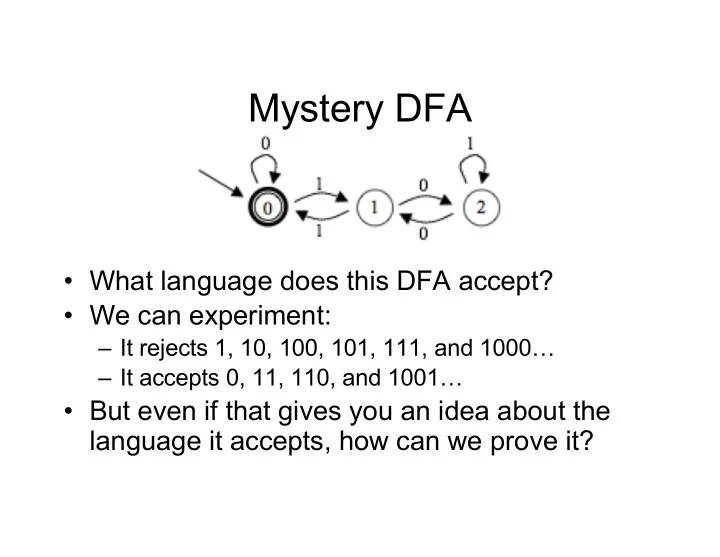

Mystery DFA • What language does this DFA accept? • We can experiment: – It rejects 1, 10, 100, 101, 111, and 1000… – It accepts 0, 11, 110, and 1001… • But even if that gives you an idea about the language it accepts, how can we prove it?
Transition Function Lemma Lemma 3.5.1: for all states i ∈ Q and symbols c ∈ Σ , δ ( i , c ) = (2 i+c ) mod 3 • Proof is by enumeration: – δ (0, 0) = 0 = (2 × 0 + 0) mod 3 – δ (0, 1) = 1 = (2 × 0 + 1) mod 3 – δ (1, 0) = 2 = (2 × 1 + 0) mod 3 – δ (1, 1) = 0 = (2 × 1 + 1) mod 3 – δ (2, 0) = 1 = (2 × 2 + 0) mod 3 – δ (2, 1) = 2 = (2 × 2 + 1) mod 3
Function val For Binary Strings • Define val( x ) to be the number for which x is an unsigned binary representation • For completeness, define val( ε ) = 0 • For example: – val(11) = 3 – val(111) = 7 – val(000) = val(0) = val( ε ) = 0 • Using val we can say something concise about δ *(0, x ) for any x …
Off To A Bad Start... Lemma 3.5.2, weak: L ( M ) = { x | val( x ) mod 3 = 0} • This is what we ultimately want to prove: M defines the language of binary representations of numbers that are divisible by 3 • But proving this by induction runs into a problem
Lemma 3.5.2, weak: L ( M ) = { x | val( x ) mod 3 = 0} Proof : by induction on | x |. Base case : when | x | = 0, we have: δ *(0, x ) = δ *(0, e) (since | x | = 0) (by definition of δ *) = 0 so in this case x ∈ L ( M ) and val( x ) mod 3 = 0. Inductive case : when | x | > 0, we have: δ *(0, x ) = δ *(0, yc ) (for some symbol c and string y ) = δ ( δ *(0, y ), c ) (by definition of δ *) = ??? The proof gets stuck here: our inductive hypothesis is not strong enough to tell us what δ *(0, y ) is, when val( y ) is not divisible by 3
Proving Something Stronger • We tried and failed to prove L ( M ) = { x | val( x ) mod 3 = 0} • To make progress, we need to prove a broader claim: δ *(0, x ) = val( x ) mod 3 • That implies our original lemma, but gives us more to work with • A common trick for inductive proofs • Proving a strong claim can be easier than proving a weak one, because it gives you a more powerful inductive hypothesis
The Mod 3 Lemma Lemma 3.5.2, strong: δ *(0, x ) = val( x ) mod 3 • This follows from Lemma 3.5.1 by induction • Proof is by induction on the length of the string x
Lemma 3.5.2, strong: δ *(0, x ) = val( x ) mod 3 Proof : by induction on | x |. Base case : when | x | = 0, we have: δ *(0, x ) = δ *(0, ε ) (since | x | = 0) (by definition of δ *) = 0 (since val( x ) mod 3 = val( ε ) mod 3 = 0) = val( x ) mod 3 Inductive case : when | x | > 0, we have: δ *(0, x ) = δ *(0, yc ) (for some symbol c and string y ) = δ ( δ *(0, y ), c ) (by definition of δ *) = δ (val( y ) mod 3, c ) (using the inductive hypothesis) = (2(val( y ) mod 3)+ c ) mod 3 (by Lemma 3.5.1) = 2(val( y )+ c ) mod 3 (using modulo arithmetic) = val( yc ) mod 3 (using binary arithmetic: val( yc ) = 2(val( y ))+ c ) = val( x ) mod 3 (since x = yc )
Mystery DFA's Language • Lemma 3.5.2, strong: δ *(0, x ) = val( x ) mod 3 • That is: the DFA ends in state i when the binary value of the input string, divided by 3, has remainder i • So L ( M ) = the set of strings that are binary representations of numbers divisible by 3 • Those examples again: – It rejects 1, 10, 100, 101, 111, and 1000… – It accepts 0, 11, 110, and 1001…
What about this one? 1 0 1 0 1 0 1 0
Recommend
More recommend